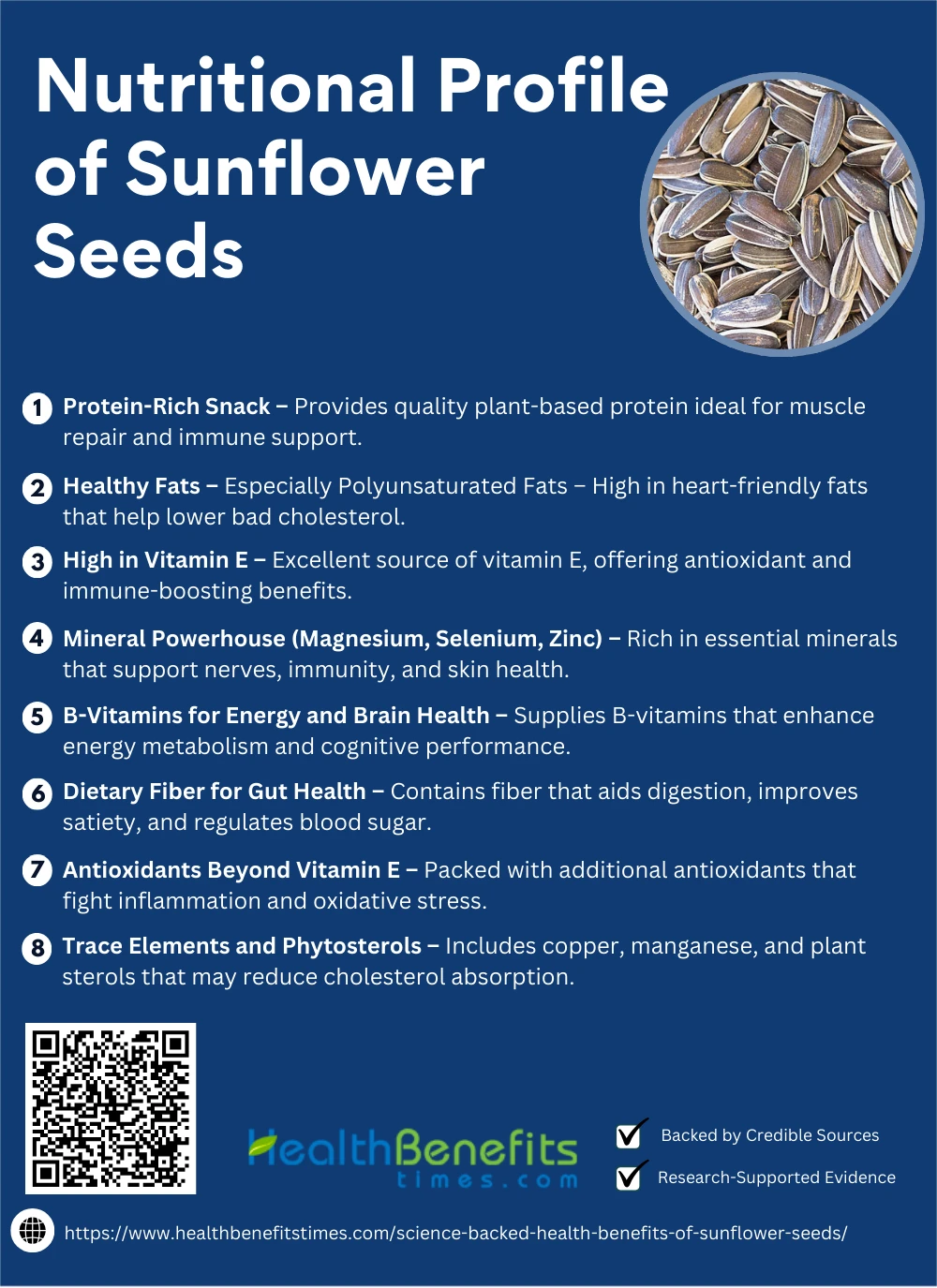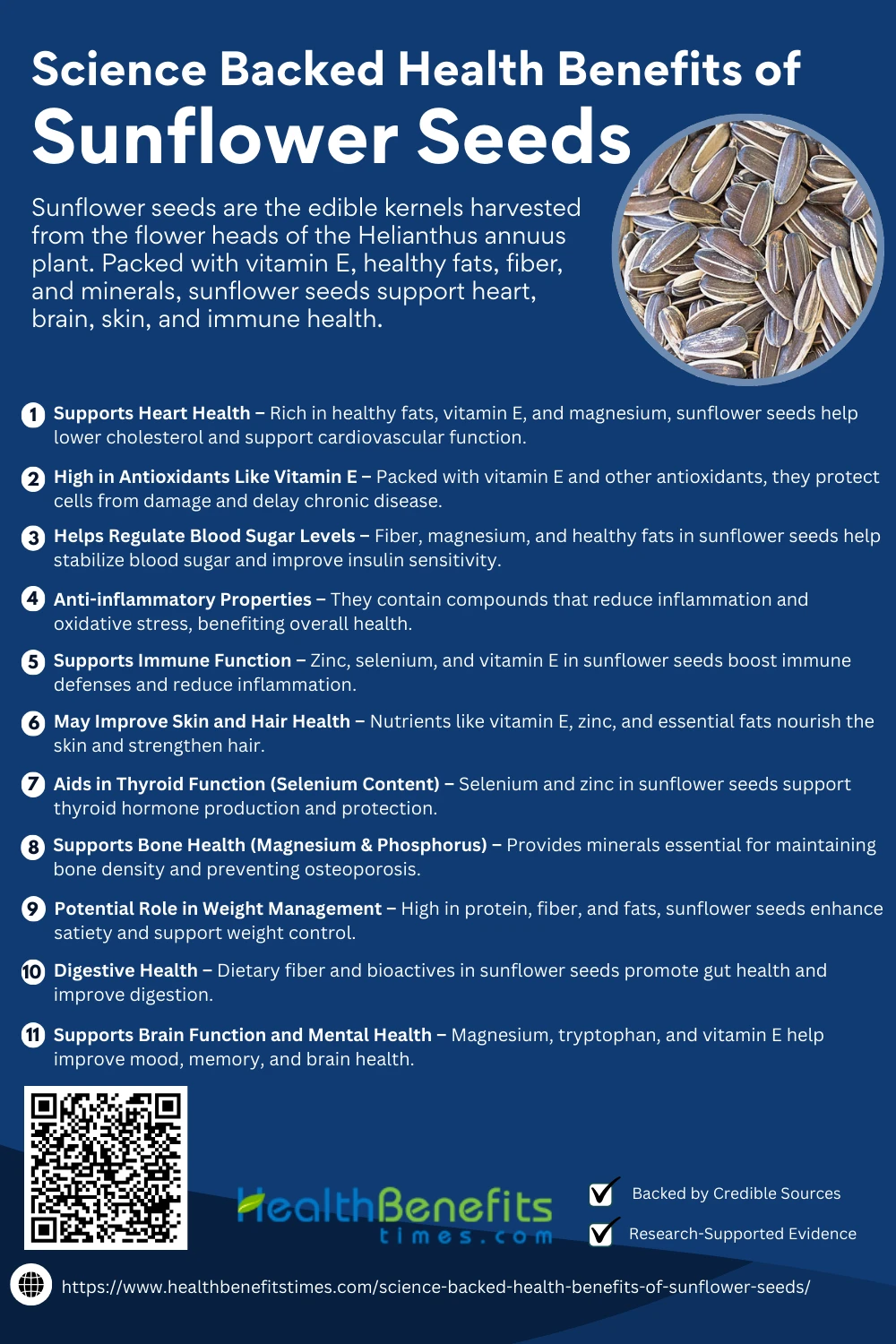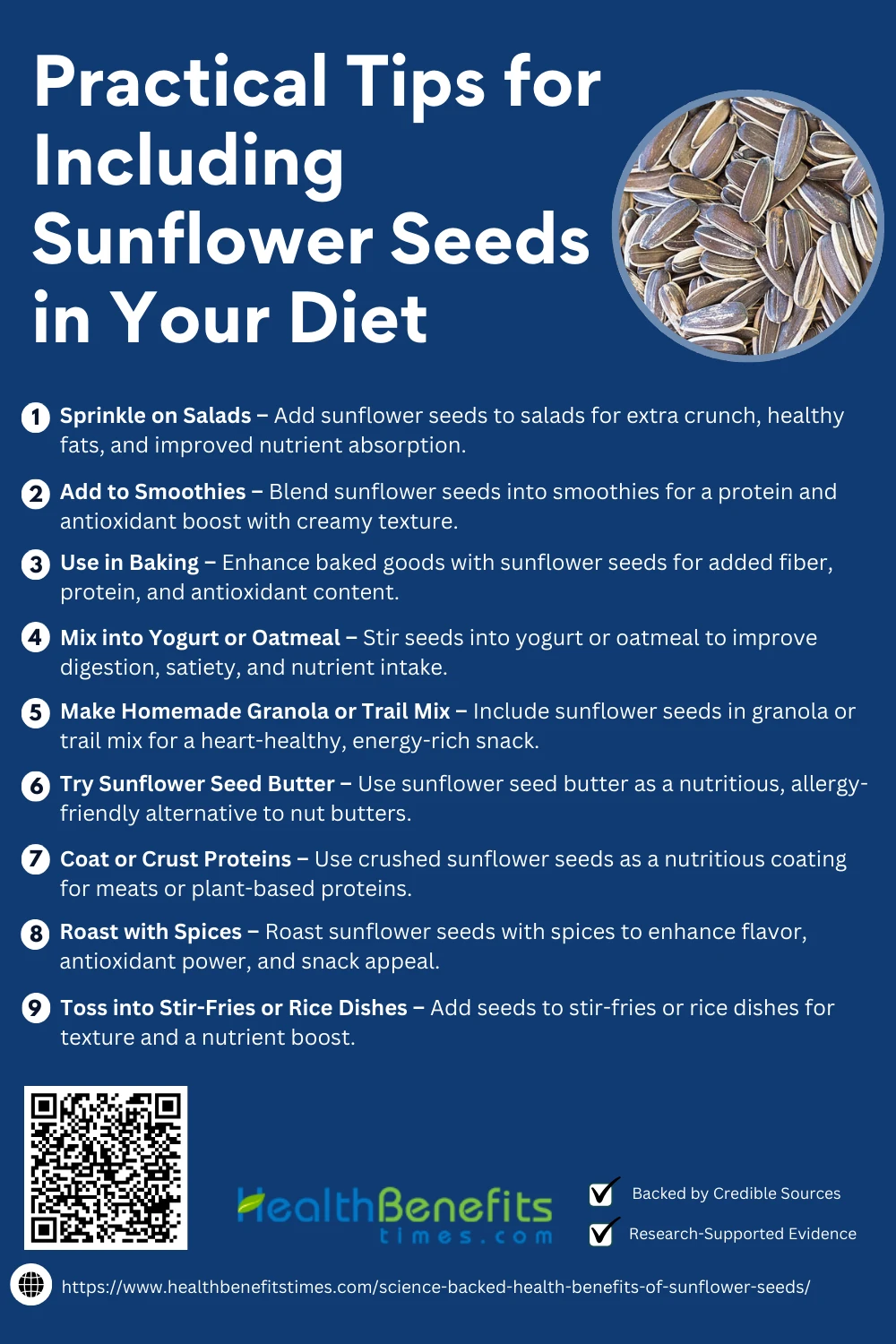- Sunflower seeds are the edible kernels harvested from the flower heads of the Helianthus annuus plant.
- Packed with vitamin E, healthy fats, fiber, and minerals, sunflower seeds support heart, brain, skin, and immune health.
- Scientific studies confirm their antioxidant, anti-inflammatory, and metabolic benefits, making them a powerful addition to a balanced diet.
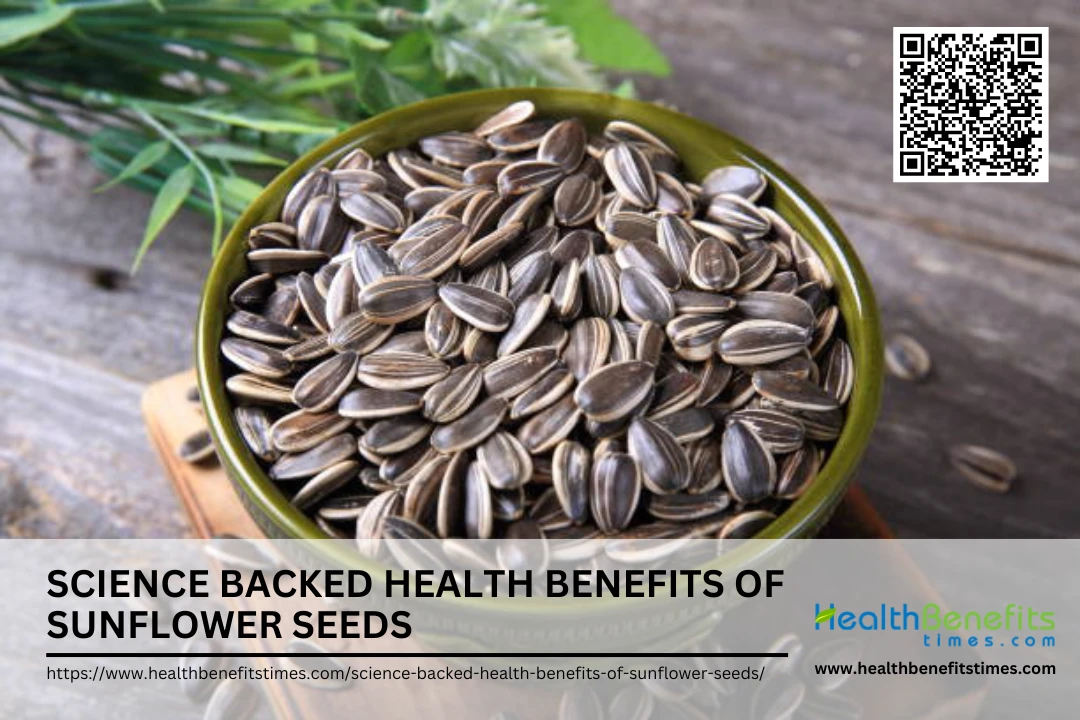 Sunflower seeds are the edible seeds harvested from the flower heads of the Helianthus annuus plant, commonly consumed as a snack or used in cooking due to their dense nutritional profile and health-promoting properties. Packed with an impressive mix of essential nutrients including vitamin E, magnesium, selenium, and beneficial fats, sunflower seeds have been widely researched for their positive impact on human health. Studies show they support cardiovascular wellness, enhance immune function, and even provide neuroprotective benefits due to their antioxidant-rich composition. Emerging research also highlights their role in promoting cognitive performance and metabolic regulation, making them an excellent dietary addition for health-conscious individuals.
Sunflower seeds are the edible seeds harvested from the flower heads of the Helianthus annuus plant, commonly consumed as a snack or used in cooking due to their dense nutritional profile and health-promoting properties. Packed with an impressive mix of essential nutrients including vitamin E, magnesium, selenium, and beneficial fats, sunflower seeds have been widely researched for their positive impact on human health. Studies show they support cardiovascular wellness, enhance immune function, and even provide neuroprotective benefits due to their antioxidant-rich composition. Emerging research also highlights their role in promoting cognitive performance and metabolic regulation, making them an excellent dietary addition for health-conscious individuals.
Nutritional Profile of Sunflower Seeds
Sunflower seeds are a powerhouse of essential nutrients, offering healthy fats, protein, fiber, vitamins, and minerals. Their dense nutritional profile makes them a valuable addition to a balanced, health-conscious diet.
- Protein-Rich Snack
Sunflower seeds provide a moderate amount of plant-based protein—roughly 20–21 grams per 100 grams. This makes them a great option for vegetarians and vegans aiming to enhance their daily protein intake. The protein quality is boosted by a favorable amino acid profile, making it suitable for muscle repair and immune function. - Healthy Fats – Especially Polyunsaturated Fats
A standout nutritional attribute is their high content of polyunsaturated fats, especially linoleic acid (omega-6) and some monounsaturated fats like oleic acid. These fats are known to reduce LDL cholesterol and support heart health when consumed in moderation. - High in Vitamin E
Sunflower seeds are one of the best natural sources of vitamin E—specifically alpha-tocopherol. This fat-soluble antioxidant protects cells from oxidative damage and supports skin, eye, and immune health. - Mineral Powerhouse (Magnesium, Selenium, Zinc)
They’re loaded with essential minerals like magnesium (which supports nerve function and blood pressure regulation), selenium (an antioxidant co-factor), and zinc (critical for immune function and skin healing). A handful can cover a significant percentage of daily needs for these minerals. - B-Vitamins for Energy and Brain Health
Sunflower seeds contain B-complex vitamins such as B1 (thiamine), B3 (niacin), and B6, all of which help the body convert food into energy and support brain function. These micronutrients are particularly beneficial during high-stress periods or for supporting cognitive focus. - Dietary Fiber for Gut Health
With about 8–9 grams of fiber per 100 grams, sunflower seeds contribute to digestive health, promoting satiety and regular bowel movements. Fiber also helps in stabilizing blood sugar and reducing cholesterol absorption. - Antioxidants Beyond Vitamin E
In addition to vitamin E, sunflower seeds contain phenolic acids, flavonoids, and other polyphenolic compounds that have been shown to reduce inflammation and combat oxidative stress at the cellular level. - Trace Elements and Phytosterols
Sunflower seeds also contain trace elements like copper and manganese, and plant sterols which may help reduce cholesterol levels. Phytosterols have structural similarities to cholesterol and help block its absorption in the intestine.
Key Health Benefits of Sunflower Seeds
Sunflower seeds offer a variety of science-backed health benefits. From supporting heart and skin health to boosting immunity and managing blood sugar, these tiny seeds pack a powerful nutritional punch.
1. Supports Heart Health
Sunflower seeds are rich in heart-healthy fats, particularly linoleic acid, which helps lower LDL cholesterol and reduce cardiovascular risk. Their high vitamin E content prevents oxidative damage to blood vessels. (1) Additionally, magnesium aids in blood pressure regulation, while fiber and phytosterols support cholesterol management. (2) (3) Antioxidants further lower inflammation. (4) Regular consumption has been associated with improved vascular function. (5)
2. High in Antioxidants Like Vitamin
Sunflower seeds are a rich source of vitamin E, a fat-soluble antioxidant known for protecting cell membranes from oxidative damage. (6) This powerful antioxidant helps reduce the risk of chronic diseases by neutralizing free radicals. (7) Vitamin E in sunflower oil has also shown to enhance skin repair and immune defense. (8) Additionally, it supports heart health and maintains cellular stability. (4) Its inclusion in diets may delay age-related degeneration. (3)
3. Helps Regulate Blood Sugar Levels
Sunflower seeds may aid in blood sugar regulation due to their high fiber, magnesium, and polyunsaturated fat content. These nutrients enhance insulin sensitivity and reduce post-meal glucose spikes. (9) Their low glycemic index supports gradual glucose absorption. (3) Magnesium plays a key role in glucose metabolism. (2) Antioxidants like vitamin E also reduce inflammation linked to insulin resistance. (10) A daily intake may support glycemic control in metabolic disorders. (4)
4. Anti-inflammatory Properties
Sunflower seeds possess notable anti-inflammatory compounds such as vitamin E, polyunsaturated fatty acids, and flavonoids. These compounds reduce the production of pro-inflammatory cytokines and help neutralize oxidative stress. (11) Luteolin in sunflower seeds also demonstrates potent anti-inflammatory effects . (12) High-oleic sunflower oil has been associated with vascular anti-inflammatory benefits. (13) Omega-3-rich seed oils exhibit endothelial protective effects. (10) Furthermore, seed-derived polysaccharides may reduce gut inflammation. (14)
5. Supports Immune Function
Sunflower seeds enhance immune defense through their rich supply of zinc and selenium—key minerals involved in cell-mediated immunity and antioxidant defense. (15) Vitamin E and selenium work synergistically to reduce inflammation and bolster immunity. (16) A deficiency in these micronutrients can impair immune responses. (17) Studies affirm sunflower seed extract modulates immune markers. (18) Additionally, they contribute to the regulation of systemic inflammation. (19)
6. May Improve Skin and Hair Health
Sunflower seeds are rich in vitamin E, a potent antioxidant that protects skin cells from oxidative stress and promotes healing. (20) Zinc and selenium contribute to hair follicle strength and scalp repair. (21) Their essential fatty acids help maintain skin elasticity and hydration. (22) Sunflower oil is also used in herbal skincare formulations. (2) Collectively, these nutrients support youthful skin and stronger hair strands.
7. Aids in Thyroid Function (Selenium Content)
Sunflower seeds are a plant-based source of selenium and zinc—two critical minerals required for the synthesis of thyroid hormones. (23) Selenium protects the thyroid gland from oxidative damage during hormone production. (24) Zinc aids in the conversion of T4 to active T3 hormone. (25) Combined with iodine, these nutrients support metabolic regulation. (26) Daily inclusion of seeds may promote thyroid health. (27)
8. Supports Bone Health (Magnesium & Phosphorus)
Sunflower seeds are a natural source of key bone-building minerals, including magnesium, phosphorus, and calcium, which play essential roles in maintaining skeletal strength. Magnesium enhances calcium absorption, while phosphorus supports bone matrix formation. (28) A study highlighted the positive effect of sunflower seed peptides on bone mass density in calcium-deficient diets. (29) Other research confirms these seeds help improve mineral retention and bone density. (15) Their nutrient-rich profile may help prevent osteoporosis and promote long-term skeletal health. (30) (31)
9. Potential Role in Weight Management
Sunflower seeds are gaining recognition for their potential role in weight management, thanks to their rich content in protein, fiber, and healthy fats. These nutrients collectively contribute to satiety, helping reduce overall calorie intake. A study in Medicines emphasizes that sunflower seeds promote fullness due to their dense nutrient profile, making them ideal for portion control. (32) Another literature review affirms that fiber and protein-rich foods enhance satiety and reduce hunger, assisting long-term weight goals. (33) Sunflower oil, particularly rich in polyunsaturated fats, can aid metabolism and reduce body weight gain. (34) Additional studies have shown sunflower-based diets reduce body fat and improve insulin sensitivity. (35) Finally, a meta-review supports the anti-obesity effects of sunflower seeds through mechanisms like appetite control and digestive energy expenditure. (36)
10. Digestive Health
Sunflower seeds support digestive health through their rich dietary fiber and bioactive compounds. Fiber aids in gut motility and supports beneficial microbial populations. (37) Fermented sunflower meal enhances gut lactic acid bacteria and reduces intestinal inflammation. (38) Their phytochemical profile may also enhance digestion and nutrient absorption (EBSCOhost). Sunflower fiber may protect mucosal lining. (39) These effects collectively support a healthier gut environment. (40)
11. Supports Brain Function and Mental Health
Sunflower seeds contain magnesium, vitamin E, and tryptophan—key nutrients for optimal brain and mood regulation. Magnesium enhances synaptic plasticity and neural calmness. (41) Tryptophan boosts serotonin production, helping to regulate mood and prevent anxiety. (42) Vitamin E protects neurons from oxidative stress. (43) Studies also show sunflower seed oil improves neurotransmitter activity. (44) B-complex vitamins in seeds further support cognitive clarity. (45)
Practical Tips for Including Sunflower Seeds in Your Diet
Incorporating sunflower seeds into your meals is simple and delicious. These versatile seeds can enhance salads, smoothies, snacks, and baked goods, adding crunch, flavor, and essential nutrients to your diet.
Sprinkling sunflower seeds on salads not only adds crunch but also boosts nutritional value with healthy fats, vitamin E, and antioxidants. They enhance flavor while supporting cardiovascular and anti-inflammatory health. (46) Their presence in salad oils also improves absorption of fat-soluble vitamins and adds dietary fiber for digestion. (47) (48)
2. Add to Smoothies
Blending sunflower seeds into smoothies enriches the drink with protein, magnesium, and healthy fats, supporting energy levels and muscle repair. Their mild flavor pairs well with fruits or greens, enhancing both taste and texture. (49) They also offer antioxidant benefits for cellular protection and may reduce metabolic load in comparison to saturated fats. (50) (51)
3. Use in Baking
Incorporating sunflower seeds into baked goods boosts nutritional value with antioxidants, fiber, and essential fatty acids. These seeds improve textural richness and deliver omega-6 and protein benefits. (5) Studies confirm sunflower-enriched crackers enhance antioxidant activity. (52) They’re ideal for functional, nutrient-dense snacks. (53)
4. Mix into Yogurt or Oatmeal
Mixing sunflower seeds into yogurt or oatmeal adds a crunch while boosting fiber, protein, and vitamin E content—great for digestion and sustained energy. (54) Their natural oils support fat-soluble vitamin absorption. (55) This combo enhances breakfast satiety and nutrient balance. (28)
5. Make Homemade Granola or Trail Mix
Homemade granola or trail mix with sunflower seeds offers a nutrient-dense snack packed with healthy fats and antioxidants. Sunflower seeds are rich in polyunsaturated fats and vitamin E, known for promoting cardiovascular health. (56) Their fiber content supports digestion, while the mix of nuts, oats, and dried fruits makes it energy-boosting. (57) The antioxidant benefits of sunflower seeds have been confirmed for their ability to combat oxidative stress. (58)
6. Try Sunflower Seed Butter
Sunflower seed butter is a flavorful alternative to nut butters and an excellent source of vitamin E and heart-healthy unsaturated fats. (59) Regular consumption supports immune and skin health due to its antioxidant properties. (60) It’s particularly beneficial for those with nut allergies and can be used in smoothies, sandwiches, or desserts. (61)
7. Coat or Crust Proteins
Crushing sunflower seeds into a coarse texture to coat chicken, tofu, or fish can boost both flavor and nutrition. These seeds provide a crunchy, nutrient-rich alternative to breadcrumbs, adding protein, unsaturated fats, and antioxidants to meals. (62) Their incorporation in coatings has shown positive outcomes for texture and nutrient retention in fried chicken applications. (63) Additionally, edible seed crusts like sunflower may enhance fat uptake control and health-oriented culinary innovation. (64)
8. Roast with Spices
Roasting sunflower seeds with turmeric, paprika, or black pepper not only adds flavor but amplifies their antioxidant potency and fiber value. Roasting improves nutrient bioavailability while spices contribute synergistic anti-inflammatory effects. (65) Sunflower seeds, already rich in vitamin E and lignans, show enhanced benefits post-roasting due to phenolic compound release. (28) Spiced roasted variants also yield better moisture content and taste appeal, making them ideal for snacking or topping dishes. (66)
9. Toss into Stir-Fries or Rice Dishes
Tossing sunflower seeds into stir-fries or rice dishes adds texture and boosts nutritional value with fiber, healthy fats, and antioxidants. These seeds enhance heart and gut health (Bentham Science), enrich flavor profiles, and support vitamin E and selenium intake for immune function. (67) (68)
Recommended Daily Intake and Portion Sizes
Understanding the recommended daily intake and portion sizes of sunflower seeds is essential to gaining their health benefits without consuming excess calories or fat. While nutrient-dense, sunflower seeds are also calorie-rich, making moderation key. A typical serving is about 1 ounce (28 grams), which provides a balanced dose of healthy fats, protein, fiber, and essential vitamins and minerals. This section explores science-backed guidelines to help you include sunflower seeds in your diet smartly and sustainably.
| Age Group | Recommended Portion Size | Frequency | Key Notes |
| Children (4–8 yrs) | 1 tbsp (15g) | 3–4 times per week | Introduce gradually; supervise to prevent choking. Great for snacks or yogurt. |
| Children (9–13 yrs) | 0.5 oz (14g) | 4–5 times per week | Rich in vitamin E and magnesium, supports growth and immunity. |
| Teens (14–18 yrs) | 1 oz (28g) | Daily or every other day | Ideal for energy needs and hormonal support due to zinc and B vitamins. |
| Adults (19–50 yrs) | 1 oz (28g) | Daily | Supports heart, brain, and metabolic health with fiber, fats, and antioxidants. |
| Older Adults (51+) | 0.5–1 oz (14–28g) | 3–5 times per week | Good for bone, cognitive, and immune support with minimal digestive load. |
| Pregnant/Lactating | 1 oz (28g) | Daily | Excellent source of folate, selenium, and healthy fats for fetal development. |
Potential Side Effects and Precautions
While sunflower seeds are nutritious, they may pose risks if overconsumed. Potential concerns include allergies, high calorie intake, added salt in processed versions, and possible heavy metal contamination in some sources.
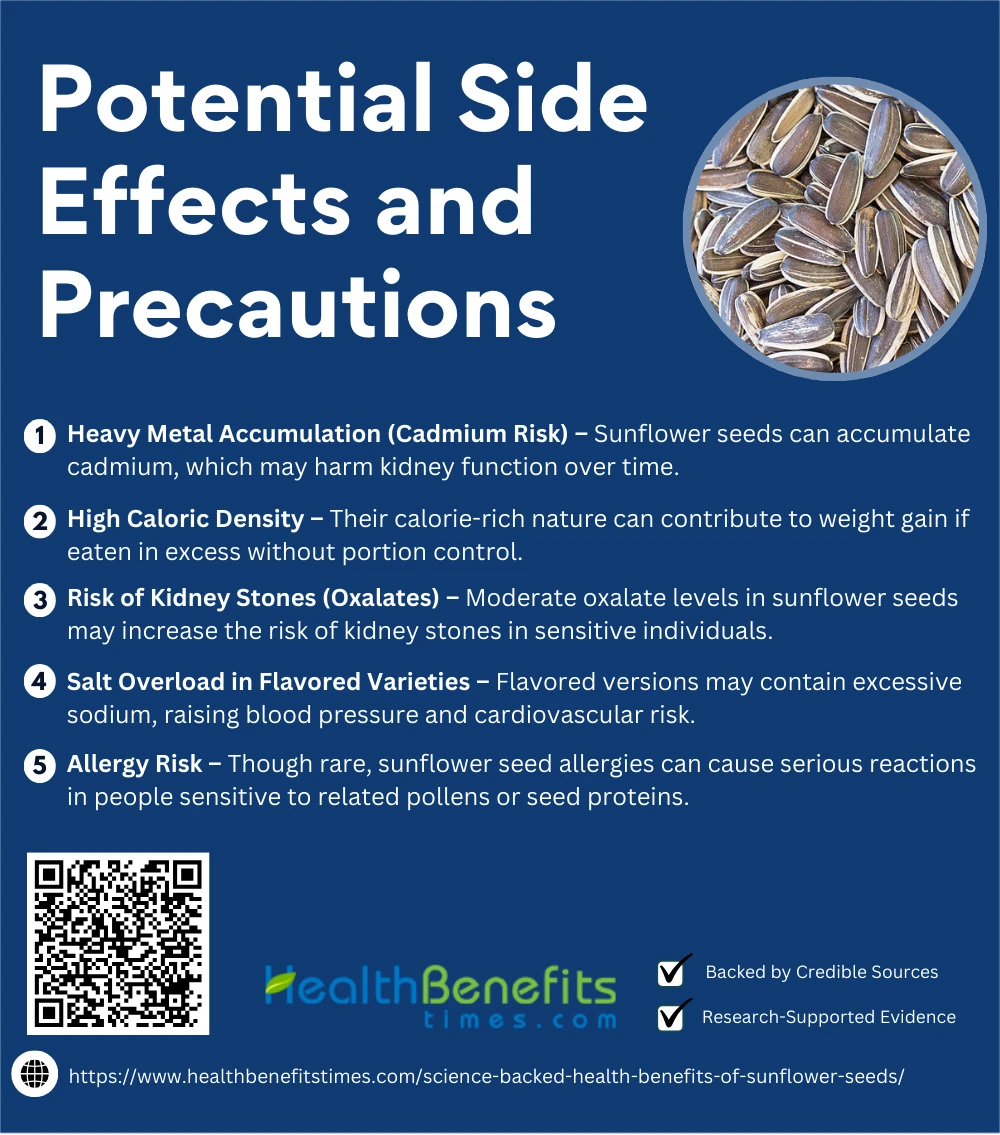 1. Heavy Metal Accumulation (Cadmium Risk)
1. Heavy Metal Accumulation (Cadmium Risk)
Sunflower seeds can accumulate cadmium, a toxic heavy metal that builds up in the kidneys over time, posing a risk for renal dysfunction when consumed excessively. Studies confirm that sunflower kernels can carry notable cadmium levels, impacting kidney health and food safety standards. (69) (70) (71)
2. High Caloric Density
Sunflower seeds are calorie-dense—about 163 calories per ounce—and high in fat, making overconsumption easy, especially when snacking. If not portion-controlled, they may contribute to unintended weight gain or hinder weight loss efforts. (72) Studies link energy-dense diets to increased obesity risk and advise moderation even with healthy seeds. (36) (73)
3. Risk of Kidney Stones (Oxalates)
Sunflower seeds contain moderate oxalate levels, which may contribute to the formation of calcium oxalate kidney stones in susceptible individuals. Those with a history of kidney stones should limit intake or consult a healthcare provider. (74) Oxalates can bind calcium, disrupting mineral balance. Hydration and moderation are key preventive steps. (28)
4. Salt Overload in Flavored Varieties
Flavored sunflower seeds often contain excessive sodium, potentially leading to high blood pressure and cardiovascular strain when consumed in large amounts. Research indicates that excessive dietary sodium from salty snacks significantly increases hypertension risk. (75) A study highlights that flavored sunflower seeds may exceed daily sodium limits in just a few servings. This is especially concerning for those already sensitive to salt or managing kidney disease.
5. Allergy Risk
Although sunflower seed allergy is rare, it can trigger severe symptoms like anaphylaxis or oral allergy syndrome in sensitive individuals. Case studies confirm allergic reactions due to cross-reactivity with mugwort and ragweed pollens. (76) Other findings reveal that 13% of patients monosensitized to Artemisia reported sunflower seed reactions. (77) Furthermore, cross-reactive allergens like pectate lyase proteins heighten risk in already allergic individuals. (78)
Conclusion
Sunflower seeds are a nutrient-dense snack that delivers a wide range of science-backed health benefits. Rich in healthy fats, protein, fiber, and essential vitamins and minerals, they support heart health, immunity, blood sugar control, and more. With their antioxidant and anti-inflammatory properties, sunflower seeds can also aid in chronic disease prevention. However, moderation is key, as excessive intake may lead to unwanted side effects, especially in salted or processed forms. When consumed mindfully, sunflower seeds are a simple, versatile way to enhance your overall diet and well-being. Add them to meals or enjoy as a wholesome, satisfying snack.


